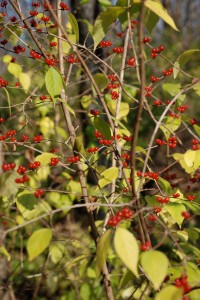Bush or Amur Honeysuckle is scattered throughout Missouri and is everywhere in the St. Louis region. There is a good chance it’s in your own backyard. The thick ornamental plant carries pretty white and yellow flowers in the spring and bright red berries in the fall and winter. But two University of Missouri–St. Louis researchers are unmoved by its beauty and say it should be destroyed.
Bob Marquis, professor of biology at UMSL, and Humberto P. Dutra, a UMSL doctoral student, have discovered that the more honeysuckle there is in natural areas throughout the St. Louis region, the greater the risk of humans contracting the tick-borne bacterial disease ehrlichiosis. The disease causes flu-like symptoms and can be treated with antibiotics.
Through large-scale observational surveys and experiments, Dutra and Marquis found that white-tailed deer are attracted to honeysuckle and often bed down in its thick green leaves. The deer serve as hosts to the lone star tick, the carrier of ehrlichiosis.
“We found more ticks under honeysuckle plants than in areas where it had been cleared,” Marquis said. “We took samples of the ticks, extracted their blood and discovered who they fed on. Eighty percent of their blood was from deer.”
In their recently published paper, “Invasive honeysuckle eradication reduces tick-borne disease risk by altering host dynamic,” which Dutra and Marquis co-wrote with scientists from Washington University in St. Louis, they go into great detail about how eradication would be beneficial to Missouri.
“If we got rid of honeysuckle, the deer would either disperse or wouldn’t come to these current spots at all,” Marquis said.
This is the first time the plant has been aligned with any human diseases. Originally from eastern Asia, the plant is spread by birds that eat the berries and carry them some distance away before depositing them.
Marquis said the Missouri Department of Conservation is aware of the problem and encourages people to dig it up and get rid of it. Forest Park in St. Louis is finishing up a multi-year project to eradicate the invasive plant from the park.
The St. Louis Beacon recently covered the research with an in-depth story on the subject. Read it here.















